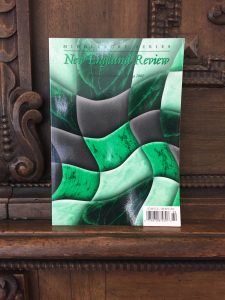
Former Poetry Editor C. Dale Young recalls first reading “The Dragon” by Brigit Pegeen Kelly, published in NER 23.2 (2002), reprinted in 35.3 (2014).
Having moved to San Francisco to complete my residency at the University of California San Francisco Medical Center, I spent day after day caring for patients with cancer and very little time reading or writing poetry. This was to be a glimpse of the life I had ahead of me. In those early years in San Francisco, my only connection to poetry were the poems I considered for the pages of NER. On the most ordinary of Thursday evenings, I rode the N-Judah home from the hospital, stopped in the lobby of my apartment building, and opened my mailbox. Inside was a letter with the return address of B. Kelly. I knew it was not a regular letter to me because below my name was “Poetry Editor, New England Review.” I opened the envelope and found “The Dragon.” It was accompanied by a two-sentence letter: “You see, I have not forgotten you. I hope you can use this.” I read the poem immediately. I stood in the lobby and read the poem several times. To say I was mesmerized would be an understatement. And I am fully aware of the full meaning of that word. Standing there, reading this poem shocked me. It snapped me out of the daily repetitiveness of my life then. I marched myself up the stairs and stood in my living room and read it again, still standing. I sat down only to compose a note to thank Brigit and to write up a sheet to forward it to the magazine’s offices in Middlebury.
Brigit was a slow and methodical poet. It was rare to receive poems for consideration from her. I have never forgotten this poem. And even now, when I feel disconnected from poetry, when I feel I am slipping away from it, I read this poem. It has become a kind of lifeline for me. I am sure I will carry it with me to the grave.
“The Dragon” by Brigit Pegeen Kelly
BUY the BACK ISSUE (23.2 or 35.3)
**
 C. Dale Young served as Poetry Consultant, Associate Editor, and then Poetry Editor of New England Review from 1995 to 2014. He practices medicine full-time and teaches in the Warren Wilson College MFA Program for Writers. He is the author of four collections of poetry—The Day Underneath the Day (2001), The Second Person (2007), Torn (2011), and The Halo (2016)—and a work of fiction, Affliction: A Novel in Stories (2018). He has received fellowships from the National Endowment for the Arts, the Guggenheim Foundation, and the Rockefeller Foundation. He lives in San Francisco with the biologist and composer, Jacob Bertrand, his spouse.
C. Dale Young served as Poetry Consultant, Associate Editor, and then Poetry Editor of New England Review from 1995 to 2014. He practices medicine full-time and teaches in the Warren Wilson College MFA Program for Writers. He is the author of four collections of poetry—The Day Underneath the Day (2001), The Second Person (2007), Torn (2011), and The Halo (2016)—and a work of fiction, Affliction: A Novel in Stories (2018). He has received fellowships from the National Endowment for the Arts, the Guggenheim Foundation, and the Rockefeller Foundation. He lives in San Francisco with the biologist and composer, Jacob Bertrand, his spouse.

 continued on as associate editor, and then became poetry editor in 2000. We have been incredibly fortunate to have had such a passionate and discerning editor selecting work for our pages for so many years, and we salute C. Dale for his versatility, reliability, and dedication. We will miss him in ways we can’t yet imagine!
continued on as associate editor, and then became poetry editor in 2000. We have been incredibly fortunate to have had such a passionate and discerning editor selecting work for our pages for so many years, and we salute C. Dale for his versatility, reliability, and dedication. We will miss him in ways we can’t yet imagine! l be Rick Barot. Rick is not only an accomplished poet but he is also a devoted reader and teacher of poetry with wide-ranging taste and vision. He served as a reader for NER for a number of years, in between publishing his poetry and essays in our pages. (Read his most recent essay,
l be Rick Barot. Rick is not only an accomplished poet but he is also a devoted reader and teacher of poetry with wide-ranging taste and vision. He served as a reader for NER for a number of years, in between publishing his poetry and essays in our pages. (Read his most recent essay,